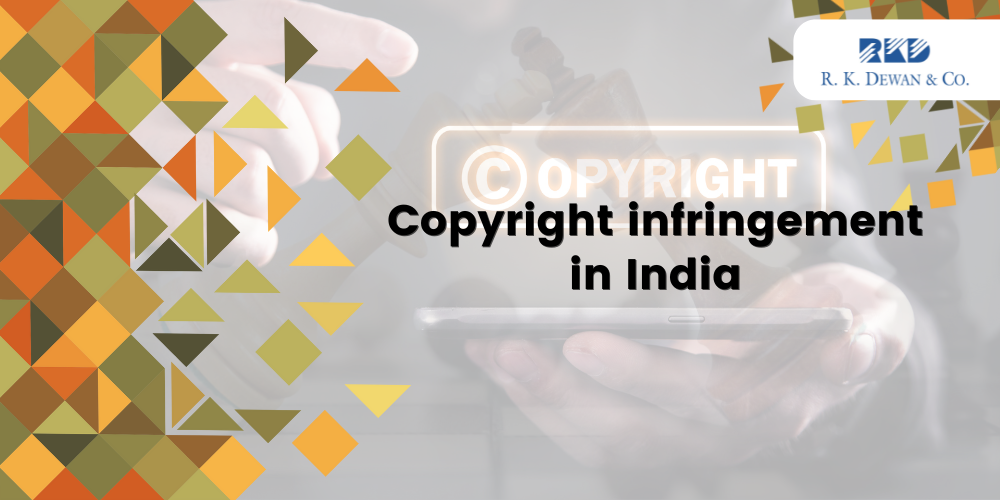Authored By – Dr. Mohan Dewan assisted by Adv. Isha Gandhi
What is Copyright Infringement?
Copyright is a negative right that lets the owner enjoy exclusive right over his/her Work without any hindrance from others. If the Work is used/ exploited by any person other than the owner without his/her authorization, it constitutes an infringement of copyright in the Work. This forms the basis of any detailed infringement analysis in legal practice.
What amounts to copyright infringement?
Copyright infringement can be primary or secondary. In case of primary infringement, the infringer copies the original work without the owner’s authorization, whereas secondary infringement covers unauthorized dealings such as selling of infringing copies of the Work, etc.
A thorough infringement analysis must consider the provisions under the Copyrights Act, 1957. According to Section 51 of the Act, copyright in a Work shall be deemed to be infringed when:
- Unauthorized use of the exclusive rights of the owner of Copyrights under the Act by any other person;
- Permitting a place for the communication of the Work to the public for a profit;
- Make or let for sale or hire copyrighted Work without authorization of the owner;
- Distribution or exhibition of infringing copies for trade and personal gains;
- Importing of infringing copies into India.
What does not amount to copyright infringement?
The acts involving a ‘fair use’ of the Work do not amount to infringement. However, the ambit of ‘fair use’ is a debatable issue and the Courts have decided it depending on the facts and circumstances of each case. For example, the use of copyrighted work for research, study, review, reporting, legislation, etc. without authorization of the owner does not amount to copyright infringement. These exceptions are a key part of any comprehensive infringement analysis.
What are the remedies for copyright infringement?
- Civil Remedies: Section 55 of the Act states that in case of infringement, the owner of Copyright shall be entitled to all such remedies by way of injunction, damages, and accounts. Depending upon the facts and circumstances of each case, following orders are commonly passed by the Indian Courts in case of infringement of Copyrights:
- Interlocutory injunction, i.e., a temporary injunction against infringement of copyrights till final disposal of the suit.
- Anton Pillar order, i.e., an order permitting the copyright owner along with a Local Commissioner appointed by the Court to search the premises and seize the infringing goods.
- John Doe order, i.e., cease and desist orders passed by the Court against unknown infringers. In such cases, the identity of the infringer is unknown to the Plaintiff and is referred to as “John Doe” till the identity becomes known.
- Criminal Remedies: Section 63 of the Act states that criminal proceedings can be initiated against the infringer by the owner of copyright and the punishment towards the same shall be imprisonment of at least 6 months which may be extended to 3 years with a fine of INR 50,000, which may extend to INR 2 lakhs.
In case of criminal action, any police officer, not below the rank of Sub-Inspector, is permitted to seize the infringing copies without a warrant and produce them before a Magistrate. This provision is frequently referred to during infringement analysis in criminal enforcement contexts.
R K Dewan & Co. has been a pillar in the field of Intellectual Property for over 79 years, offering trusted IP solutions across India and in 125+ countries. With offices in Mumbai, Delhi, Pune, Chennai, Kolkata, Bangalore, and Indore, our team of 175+ skilled professionals is dedicated to protecting and enforcing IP rights with precision and care.
We work closely with over 5,000 clients—Indian and international—guiding them through every stage of IP management. From filing and prosecution to litigation and portfolio management, RKD delivers results with a personal touch.
Our expertise in infringement analysis ensures that clients are not only protected against IP violations but also equipped with the insights needed to take swift legal action when necessary. Whether it’s patents, trademarks, copyrights, designs, or geographical indications, we help businesses turn their intellectual assets into strategic advantages.


